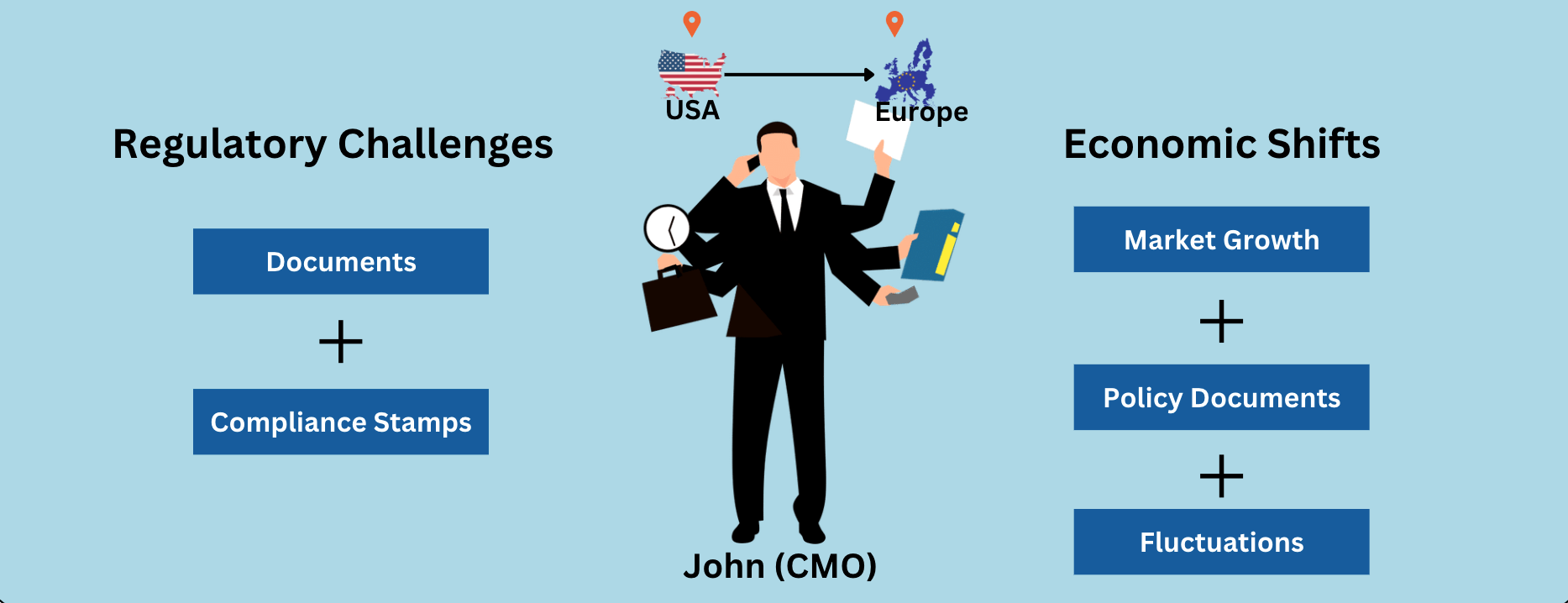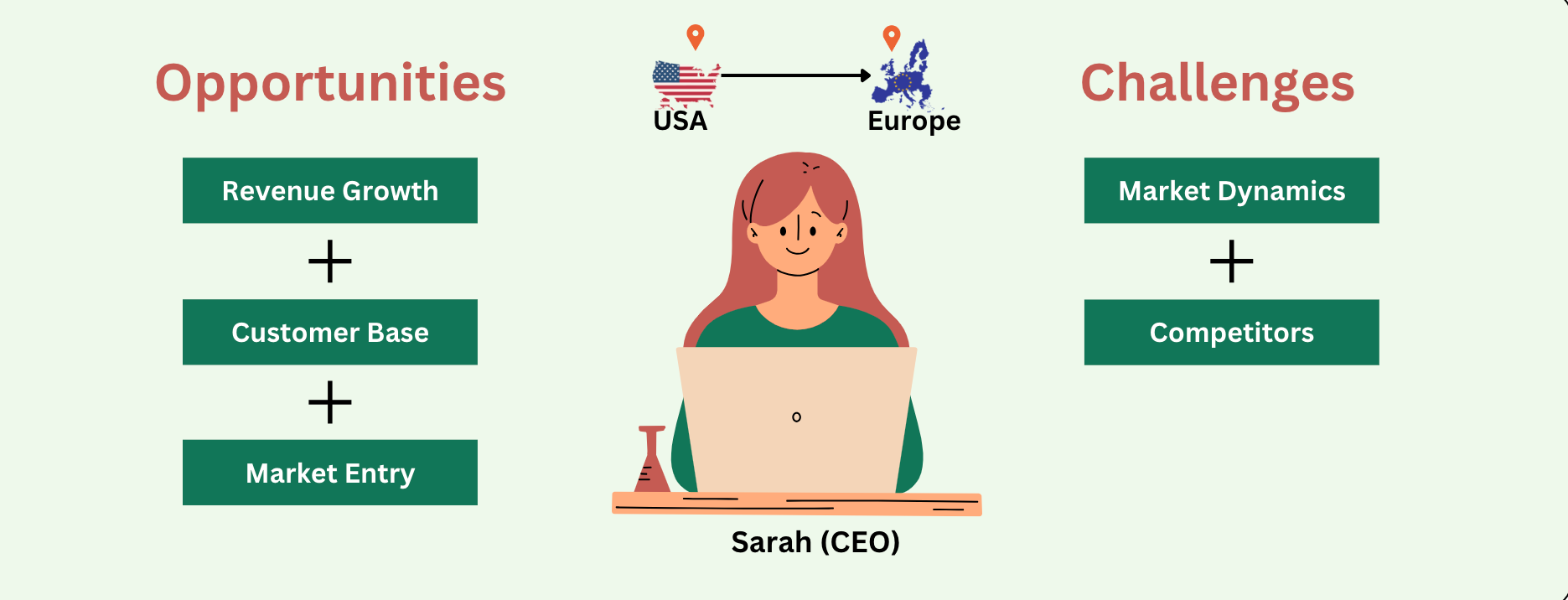Can we all agree that globalization has made a huge impact on businesses? Many U.S. companies can testify to this, especially C-level executives in startups and mid-sized companies, as globalization in business reshapes their operations.. While it opens up new markets, it also brings challenges like increased competition from international players. This means businesses must adapt quickly to stay competitive.
To paint a clearer picture, let’s say you’re the CEO of a mid-sized tech startup. Your product has just taken off in the U.S., and now you’re eyeing international markets. Globalization is what makes this possible, giving you access to new customers and revenue streams across Europe, Asia, and beyond. Market research can help you identify the best strategies for entering these markets and understanding customer needs.
As promising as the opportunities brought by globalization in business sound, they come with challenges. Different countries have varying regulations, like Europe’s strict GDPR rules, which you must follow carefully to avoid penalties.
Entering new markets also means facing fierce global competition, which can be tough if you’re not prepared. There are also logistical complexities that come with global supply chains that need careful management. Market research is needed to navigate these complexities and understand the specific needs of each market.
Curious to learn more about how globalization can affect your business and how you can adapt your products and services for different local markets and foreign markets while maintaining regulatory compliance? Then, read on to develop strong foreign market entry strategies and identify the best approaches for your business!
What Economic Shifts Do U.S. Businesses Face Due to Globalization?
Globalization in business leads to two very important factors: Balancing New Market Access and Increased Competition, and Varying Regulations and Economic Shifts. Let’s discuss both of them.
Balancing New Market Access and Increased Competition
Meet Sarah, the CEO of a mid-sized tech startup based in California. Sarah’s company has recently developed a modern software product that has become quite popular in the U.S. She’s eager to capitalize on this success, as most in her position would be.
So, she decides to expand into European and Asian markets. Globalization makes this ambitious expansion possible, giving Sarah access to a vast new customer base and the potential for notable revenue growth. Market research is required to identify the preferences and needs of these new customers.
However, Sarah soon realizes that entering foreign markets comes with its own set of challenges. She faces fierce competition from established local and international players who have a better understanding of the market dynamics and customer preferences.
Companies in Europe and Asia have been serving these markets for years and have built strong brand loyalty. Sarah’s startup now has to compete with these established players in foreign markets, which requires constant improvement to her products and adequate localization and maintaining regulatory compliance as part of her foreign market entry strategy. Identifying the target market and understanding the competition, including local companies, helps in tailoring her approach.
Balancing the excitement of new market opportunities with the reality of increased competition is a tightrope walk for Sarah. She needs to strategically plan her market entry, perhaps by leveraging tools like TextUnited to help her company’s communication be culturally and linguistically aligned with these new markets.
This way, Sarah can maintain a competitive edge while managing the complexities of globalization. Foreign direct investment can also support these efforts by providing the capital needed for market research and local partnerships.
Varying Regulations and Economic Shifts

Meet John, the Chief Marketing Officer of a mid-sized health tech company based in New York. John’s company has developed a high-tech medical device that has gained substantial traction in the U.S. market. He is enthusiastic about expanding and looks to Europe and Asia as potential new markets.
However, he quickly realizes that each region comes with its own set of regulations and economic conditions that create both opportunities and challenges.
For instance, Europe has stringent regulatory frameworks like the Medical Device Regulation (MDR) that John’s company must comply with to sell their product. While these regulations guarantee product safety and quality, they also require substantial resources to meet compliance standards, posing a challenge for John’s team.
On the flip side, successfully handling these regulations can improve the company’s reputation, making it easier to enter other regulated markets globally. Economic shifts also play an important role. In Asia, fast-growing economies like China and India present immense market opportunities but come with fluctuating policies and varying market maturity.
John must adapt his marketing strategies to align with local market conditions and localization, and consumer behaviors as part of his foreign market entry strategy. Understanding the target market and utilizing local knowledge helps in making informed decisions for his international business.
Foreign direct investment can provide the necessary funding to navigate these economic shifts and regulatory challenge. Market research is also key to understand these local conditions and make informed decisions. Tools like TextUnited can help John manage multilingual communication and confirm his marketing materials meet local regulatory requirements, turning these challenges into opportunities for growth.
Why is Localization Key to Success in Global Markets?
Now that you’ve seen the importance of balancing new market access with increased competition and handling different regulations and economic shifts, it’s important to understand why globalization in business makes localization and adapting your products and services to meet local market demands critical to success.
Localization goes beyond mere translation; it involves tailoring your products to fit the local culture, language, and consumer behaviors. This adaptation makes your product feel native to the target market, building trust and acceptance among local consumers and local business partners. Utilizing local knowledge is important for international business.
By aligning with cultural preferences, you can make sure that your business satisfies customers, builds loyalty, and achieves higher market penetration and success. With TextUnited, you can successfully localize your business by using tools and expertise to adapt your products and messaging for diverse audiences.
How Do You Handle Multilingual Communication Across Borders?
So, we’ve talked about how important localization is for global success. Now, let’s look at another big challenge: maintaining consistent messaging across different languages and cultures.
As globalization in business expands your reach, maintaining consistent messaging across different languages and cultures becomes crucial.
Let’s say you’re launching a marketing campaign; the slogan that works in the U.S. might not have the same impact in Japan or Germany. You need to keep your brand’s voice and tone uniform while adapting to local idioms, cultural norms, and context.
For you, this means coordinating efforts across multiple teams and regions, often requiring specialized tools to manage translations and cultural adjustments. In such a scenario, you can turn to a platform like TextUnited, which provides comprehensive multilingual communication solutions to simplify and synchronize your global messaging.
Are You Prepared for Regulatory Compliance in International Markets?
We’ve covered the importance of maintaining consistent messaging across different cultures, but there’s another key aspect to think about: local regulations.
You see, keeping up with and adhering to these regulations in each market is very important because if you don’t comply, it can lead to hefty fines, legal issues, and damage to your brand’s reputation.
Additionally, protecting your intellectual property is important when expanding internationally to protect your creations and maintain competitiveness.
Think about it this way: you launch your product in Europe, a key foreign market, without meeting GDPR requirements, and the consequences could be severe. Proper localization is key to maintaining compliance. Foreign direct investment can help by providing the necessary resources to meet these regulatory standards.
Now, integrating TextUnited into your regulatory workflows can make compliance easier and reduce risks. The platform helps manage translations of legal documents and makes sure your content aligns with local regulatory standards, allowing you to focus on expanding your business without the constant worry of regulatory pitfalls.
Are Traditional Methods Holding Back Your Global Growth?
So, after dealing with regulatory compliance, let’s talk about another potential roadblock: traditional methods of managing global operations.
Traditional approaches often involve manual processes, multiple spreadsheets, and endless email threads, which can be cumbersome and slow. Think about trying to coordinate a global marketing campaign using these outdated methods; it’s a logistical nightmare.
Compared to modern, cloud-based solutions which provide real-time collaboration, centralized data, and automated workflows, proper localization makes your operations more agile and organized, especially when entering a foreign market. Foreign direct investment can support the transition to these modern methods by providing the capital needed for new technologies and systems.
Tools like TextUnited fit right into this modern approach, helping you manage translations and communications smoothly, so your team can focus on growth rather than getting bogged down by outdated processes.
How Can TextUnited Support Your R&D Efforts?
We’ve talked about overcoming traditional methods, but let’s move to another important area: Research and Development (R&D).
Globalization means your R&D efforts need to be more connected than ever. Making your research documents tailored to local markets and accessible in every foreign market helps achieve smooth integration.
Say your team in the U.S. makes a breakthrough, and your colleagues in Germany and Japan need that information right away to keep their projects moving. This is where tools like TextUnited come in.
By providing real-time translation and localization of research documents, TextUnited helps your teams share information quickly and stay on the same page, speeding up product development and making collaboration smoother across borders. Foreign direct investment can also facilitate these R&D efforts by providing the necessary funding for international collaboration.
How TextUnited Helps You Succeed Globally
We’ve seen how TextUnited can support your R&D efforts, but what about the bigger picture of managing global operations in a foreign market?
Many aspects of global operations can be managed more smoothly with a single, integrated solution which is vital for successful foreign market entry strategies. Instead of juggling multiple tools and processes, think about having one platform that centralizes everything. This includes handling customer support in local languages, translating HR-related documents and training materials for local staff, and translating documents for participating in local tenders. Identifying the target market helps in these processes, making your international business operate smoothly.
For example, Rosenbauer, a global company in firefighting technology, transformed their translation processes by integrating TextUnited. They moved from a cumbersome email workflow to a cloud-based system, which reduced process time and made it easier for teams in different countries to work together.
You can read more about their experience in this case study. By having everything in one place, TextUnited helps simplify your operations, making it easier to focus on growth and achieving your goals.
Is Your Business Ready to Succeed in a Global Market?
We’ve talked about how globalization in business impacts U.S. companies, from the need for localization and multilingual communication to handling regulatory compliance and using modern tools for global operations.
TextUnited helps manage these challenges by providing solutions for real-time translation, smooth communication, and centralized operations.
Now is a good time to review your current global strategies and see how TextUnited can help you reach your goals. Curious to learn more? Visit TextUnited to see how we can support your global success!


